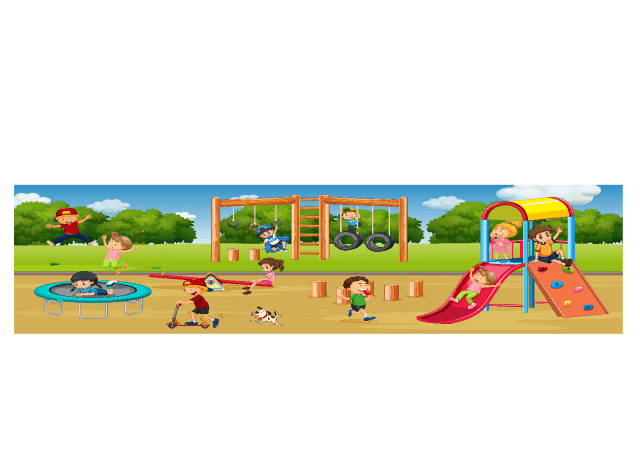Playgrounds are essential for children. They offer a safe and stimulating environment where they can engage in physical activities. Besides, spending time in playgrounds is crucial as it helps develop their social, emotional, and cognitive skills.
Children can engage in many activities on a playground that can help their overall development. Playing on playground equipment such as swings, slides, and climbing structures helps children build strength and endurance. Besides, it also helps develop motor skills in children.
They also provide opportunities for children to interact with other kids. Children can make new friends and learn how to cooperate and communicate effectively. Institutions that have a playground for children aid these little ones build self-confidence, independence, and resilience.
So, playing outdoors is the best for the overall development of children. Here are the top reasons why you should encourage playing on playgrounds for your kids.
5 Reasons Why Playgrounds Are Important For Children
Let us explore why children should engage in outdoor play on inspired playgrounds.
1. Physical Development
Playgrounds provide numerous opportunities for children to engage in physical activities. So, it can contribute to their physical development most efficiently.
Some ways in which playgrounds can help in physical development include the following.
- Improves motor skills: Playgrounds provide a range of equipment and structures that children can climb, swing, slide, and balance on. This equipment can help enhance their gross motor skills.
- Builds strength and endurance: Climbing structures, monkey bars, and other equipment help children build upper body strength and endurance.
- Enhances balance and coordination: Swinging, jumping, and running on uneven surfaces help children develop their balance and coordination.
- Promotes cardiovascular health: Playing on playgrounds can help children increase their heart rate and develop cardiovascular fitness.
2. Social Development
Playgrounds can be an excellent place for children to develop their social skills and learn how to interact with others. It also helps them avoid social anxiety to strengthen their relationships.
Here are some ways in which playgrounds can help with social development:
- Provides an opportunity to play with others: Playgrounds provide a space for children to interact with other kids their age and engage in group play. It helps children learn how to share, take turns, and cooperate with others.
- Helps in making friends: Children can make new friends on the playground, which can help them develop their social skills and build self-confidence. Interacting with other kids also helps them learn how to communicate and express themselves effectively.
- Helps in learning social norms: Playgrounds provide a setting for children to learn and practise social standards and rules. For instance, they can learn to wait in line, share equipment, and take turns. It helps children learn how to follow the rules and interact appropriately with others.
- Helps in developing empathy: Playing with other children can help children develop compassion and understanding for others. By sharing experiences and understanding others’ feelings, children can learn to be more compassionate and empathetic.
3. Emotional Development
Playgrounds can play an essential role in children’s emotional development. They help provide a safe and stimulating environment where children can explore and learn about themselves and others.
Playgrounds help in emotional development in the following ways.
- Developing self-confidence: Children can build self-confidence and a sense of accomplishment. They can try new things and challenge themselves on the playground.
- Building resilience: Playgrounds provide a space where children can learn to navigate challenges and setbacks. It can help build strength and coping skills.
- Learning to manage emotions: Playgrounds provide a space where children can experience a range of emotions, such as joy, frustration, and disappointment. Children can develop emotional regulation skills by learning to manage these emotions.
- Expressing creativity: Playgrounds often include equipment that allows children to be creative, such as sandboxes and painting areas. Engaging in creative activities can help children express themselves and explore their emotions.
4. Cognitive Development
Playgrounds can be a great place for children to develop their cognitive skills. They can offer a wide range of physical, social, and sensory experiences.
There are several ways in which playgrounds can help with cognitive development. These include the following.
- Develops problem-solving skills: Playgrounds often feature equipment that requires problem-solving, such as climbing structures or balance beams. Children can develop problem-solving skills by figuring out how to navigate these challenges.
- Improves spatial awareness: Climbing, jumping, and balancing on playground equipment can help children develop their spatial awareness.
- Encourages exploration: Playgrounds provide a space where children can explore their environment and experiment. They also provide them with knowledge on how to establish cause-and-effect relationships. This can help children develop their curiosity and desire to learn.
- Sensory exploration: Playgrounds offer a range of sensory experiences, such as different textures, sounds, and smells. Children can develop their sensory processing skills and learn to understand and interpret the world around them.
Conclusion
Playgrounds can provide a supportive environment for children to develop emotional skills. It also helps them build great skills such as self-confidence, resilience, emotional regulation, and creativity. By engaging with others and exploring the world around them, children can develop a deeper understanding of themselves and others.
Physical activity is essential for children’s health and development. The playground offers them a platform where they can engage in physical activities. Regular exercise in a playground can help prevent obesity, heart disease, and other health issues later in life.
Many playgrounds incorporate natural elements, such as trees, rocks, and sand. It can help children develop a sense of wonder and appreciation for the natural world. So, playgrounds can help in the overall development of a child.






